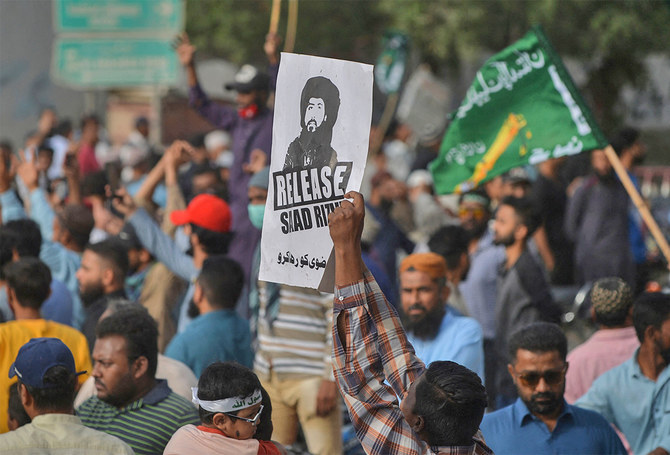ISLAMABAD: Pakistan’s Interior Minister Sheikh Rashid Ahmed said on Sunday the government was considering the release of Saad Rizvi, the leader of the banned Tehreek-e-Labbaik Pakistan (TLP) religious party who was arrested earlier this year for threatening to lead anti-government protests.
The party announced this week it would march to the capital, Islamabad, to pressure the government to release Rizvi and expel the French ambassador over caricatures of the Prophet Muhammad (PBUH) published in France last year. Thousands of supporters of the radical party on Saturday left the eastern city of Lahore, clashing for a second straight day with police. On Friday, two policemen were killed in a violent standoff between security forces and protesters.
Protesters are currently camped in Muridke, a city about 55 kilometers from Lahore, and will stay there while a TLP negotiation team meets government representatives for talks.
The party held similar protests in April this year in which six policemen were killed.
The interior minister said of 7,000 TLP supporters arrested during the April violence, cases were still pending against 173, but would now be quashed as part of an agreement with the party to convince it to give up the ongoing protest march.
“We will take back the [police] cases against the TLP by Wednesday,” Ahmed told reporters at a press conference. “Also considering the release of Saad Rizvi.”
“A negotiation team of the TLP will come to the interior ministry on Monday, and all issues will be addressed,” the minister said, adding that the party had the third largest vote bank in Punjab and the government wanted to avoid confrontation with it.
“There should be no confrontation with religious people. It’s their right to protest, and the government should show flexibility,” the minister said. “I had a one-on-one meeting with Saad Rizvi too, and their people in Muridke will go back on Wednesday.”
To a question about the expulsion of the French ambassador, a main demand by TLP, Ahmed said: “Currently, France has no ambassador in Pakistan, but we will take this matter to the National Assembly.”
The minister also directed Islamabad and Rawalpindi administrations to reopen roads and remove shipping containers placed at entrances to the city to keep out protesters.
Earlier on Sunday, Minister for Religious Affairs Noorul Haq Qadri said in a press statement negotiations between the government and the TLP were moving toward “success.”
“The protesters will record their protest till Tuesday ... Protesters will continue peaceful protests wherever they are,” Qadri said.
The minister said the government had listened to all of TLP’s demands and would consider them “seriously.” He said all roads in the country that had been closed due to the protests would be reopened by tomorrow, Monday, and there would be no confrontation between the protesters and the police.
“In case of peace, police and security agencies will not take any action against the sit-in,” Qadri said. “All the issues will be resolved with mutual discussion.”
















